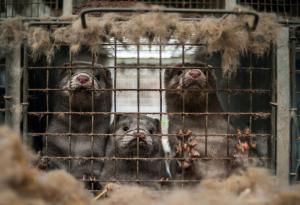Mink Farms Pose Serious, Ongoing Threats to Public Health and Economy, As Indicated By Review of Disease Outbreaks
Animal Welfare Groups Tell Minnesota DNR About the Mountain of Evidence About Zoonotic Disease Threats as the Agency Examines Mink Farm Threats
“Farmed mink are highly susceptible to and readily transmit and amplify avian-, human-, and mammalian- (e.g. swine) influenza A strains,” said Jim Keen, D.V.M. Ph.D., the director of veterinary science for the Center for a Humane Economy and a former USDA infectious disease specialist. “This includes the zoonotic bird flu H5N1 mink mutant strain that infected and caused the deaths of more than 200,000 farmed mink on six farms in Spain and Finland in 2022-2023. This bird flu strain has killed 458 of 873 human cases, a case fatality rate of 53% that is much higher than any known influenza virus including the infamous 1918 H1N1 pandemic strain.” Dr. Keen, with Tom Pool, D.V.M., MPH, are the authors of a January 2022 study on the mink farming and COVID-19 connection.
The mink industry has been in decline for decades, including in Minnesota, and domestic demand for fur has cratered. Most of the 1.2 million mink pelts produced in 2022 in the United States will go to China and Russia.
“Farmed mink are the only non-human species documented to have spilled over COVID-19 variants to humans, but even more ominously, mink are now spreading H5N1 in Europe, with very dangerous spillover potential to humans,” said Wayne Pacelle, president of Animal Wellness Action and the Center for a Humane Economy. “The Minnesota DNR should understand that if we continue to gamble and allow the small, dying mink industry to operate, other variants will almost certainly emerge and threaten human health and the global economy.”
The five variants that came from mink farms and spilled over to human beings were Cluster 5 in Denmark and the Netherlands, Marseille-4 in France, N501T in Michigan, Y453F in Poland, and unreported mutations in Latvia. When scientists in Denmark, at the time the world’s leading producer of mink, discovered the zoonotic threat, the government ordered the mass culling of the nation’s 17 million farmed mink. Some other countries across Europe likewise put an immediate end to their farmed mink industries.
The official response was different in the United States, where agriculture and public health officials at the state and federal levels minimized threats and moved to protect the mink industry rather than taking a proper precautionary approach in an era where we now better understand the threats that zoonotic diseases to public health, social behavior, and the U.S. economy.
In the wild, mink are solitary, far-roaming, and semi-aquatic. They are also uniquely susceptible to viral spread, and packing them in high numbers in cramped, crowded cages creates high levels of stress and has dangerous potential for pathogens to spread between them and people. In recent months, Finland has depopulated tens of thousands of mink infected by H5N1.
In the 117th Congress (2021-22), U.S. Representative Rosa DeLauro, D-Conn., and Representative Nancy Mace, R-SC, introduced legislation to ban mink farming because of humane and zoonotic disease-spread concerns. That legislation passed the House, but was dropped in a House-Senate conference committee. The lawmakers are soon expected to introduce the legislation again in this 118th Congress.
“We know more than enough now to make a determination that the mink farming industry is a high-risk superspreader of zoonotic disease, while contributing almost nothing to our economy,” said Michael Allen, Minnesota State Director of Animal Wellness Action. “The Minnesota DNR should bring in public health experts and come to the inescapable conclusion that this industry represents an unacceptable threat in our state.”
ABOUT
Animal Wellness Action is a Washington, D.C.-based 501(c)(4) whose mission is to help animals by promoting laws and regulations at federal, state and local levels that forbid cruelty to all animals. The group also works to enforce existing anti-cruelty and wildlife protection laws. Animal Wellness Action believes helping animals helps us all. Twitter: @AWAction_News
The Center for a Humane Economy is a Washington, D.C.-based 501(c)(3) whose mission is to help animals by helping forge a more humane economic order. The first organization of its kind in the animal protection movement, the Center encourages businesses to honor their social responsibilities in a culture where consumers, investors, and other key stakeholders abhor cruelty and the degradation of the environment and embrace innovation as a means of eliminating both. The Center believes helping animals helps us all. Twitter: @TheHumaneCenter
Wayne Pacelle Pacelle
ANIMAL WELLNESS ACTION
+1 202-420-0446
email us here
Visit us on social media:
Facebook
Twitter
1 https://nam11.safelinks.protection.outlook.com/?url=https%3A%2F%2Fcenterforahumaneeconomy.org%2Fwp-content%2Fuploads%2F2022%2F03%2FMink-Farming-SARS-CoV-2-by-Jim-Keen-DVM-PhD.pdf&data=05%7C01%7CJulie%40centerforahumaneeconomy.org%7C7ae1fcbcf6fb4f94278e08dbe46c2eb8%7Cdf917bf4f70c43d5bd3292b99957b42c%7C0%7C0%7C638354925576311489%7CUnknown%7CTWFpbGZsb3d8eyJWIjoiMC4wLjAwMDAiLCJQIjoiV2luMzIiLCJBTiI6Ik1haWwiLCJXVCI6Mn0%3D%7C3000%7C%7C%7C&sdata=myUPphoCDv0zo6WNqNnAZirXwIvJZK0Sm2DqwhLJb1M%3D&reserved=0

